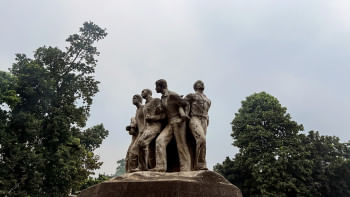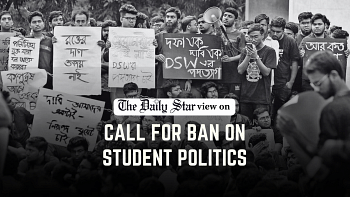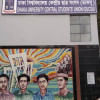Why the DUCSU constitution needs reform

The Dhaka University Central Students' Union (DUCSU) and hall union elections have long been symbolic of student activism and democratic values within Dhaka University. However, in its 102-year history, DUCSU elections have been held 37 times in total; since Bangladesh's independence in 1971, it has been held seven times between 1972 and 2019, the last one coming after nearly three decades of hiatus. This stark irregularity stands in contrast to the university's legacy as a cradle of democratic movements.
A key reason for this lies in the constitution of DUCSU and hall unions, as well as the Dhaka University Order of 1973, which collectively failed to enforce a mandatory schedule for regular elections. Article 8(e) of the DUCSU constitution gives the vice-chancellor, who also serves as the ex-officio DUCSU president, exclusive power to announce election dates. Thus, the absence of elections, though undemocratic, does not technically violate the constitution.
Moreover, Article 6(c) states that elected representatives will hold office for one year, with a 90-day extension if necessary. After that, their positions are vacated, regardless of whether a new election is held. This legal void enables prolonged inaction, exposing how the DUCSU constitution permits administrative discretion over democratic rights.
According to Article 19 of the Dhaka University Order, 1973, there are 10 governing authorities at DU, including the Senate, Syndicate, Academic Council, and Finance Committee, but students are allowed representation only in the Senate. Even this participation is limited. Article 20(1)(L) of the same order allows five DUCSU-nominated members to join the Senate, but in practice, these are appointed at the VC's discretion, with no accountability to the student body.
This was starkly evident in 2019 when, after the controversial DUCSU polls, four out of the five Senate nominees were affiliated with the then ruling party's student wing: two unelected and two elected through the widely disputed results. Such unilateral selections defeat the purpose of student representation and reinforce partisan control over student affairs.
Taken together, the above-mentioned articles of the DUCSU constitution and the Dhaka University Order don't necessarily empower the students for decision-making, leaving the power in the VC's hands to appoint and dismiss DUCSU representatives instead.
This concentration of power echoes colonial hierarchies, with the students relegated to a powerless status. While students have historically taken the lead in confronting national crises—from the Language Movement to recent democratic uprisings—DU administrators and teachers often shirk accountability, especially post-crisis. The silence of the DU authorities following the crackdown on students during the July uprising last year, and their complicity in the government-sponsored violence against protesters, only deepened this credibility crisis.
Similarly, the teachers-turned-administrators overseeing DUCSU reforms have failed to champion the students' rights. Instead of advancing democratic participation, their proposed reforms entrench the existing power dynamics and neglect structural defects, enabling further decay of DUCSU's institutional integrity.
The solution lies in introducing amendments to the very structure that permits undemocratic practices. One of the most pressing demands from student organisations is the removal of administrators from executive roles in student unions. Specifically: i) the VC should no longer serve as the DUCSU president; ii) hall provosts should not be the presidents of hall unions; and iii) treasurers should be elected, not appointed.
Instead, student representatives should be elected directly to all DUCSU and hall union posts. A proposed model includes an advisory council comprising teachers, alumni, administrators, and student leaders, with the VC serving as the chief adviser. This council could guide the union, propose constitutional reforms to the Syndicate, and supervise emergency elections. Such a model would balance oversight with student autonomy and promote inclusive governance.
Reform before election
Some voices within the university administration as well as certain student circles argue for holding elections first and pursuing reforms later. However, Article 16 of the DUCSU constitution gives the Syndicate the sole authority to amend the constitution. It contains no provision for soliciting suggestions from elected student bodies. Moreover, according to Article 23 of the Dhaka University Order, students are excluded from the Syndicate altogether. Hence, unless these provisions are amended, elected DUCSU members will remain powerless to initiate meaningful changes.
Claims that "essential reforms have already been made" are, in my opinion, either ignorant or deceptive. The administration has not enacted the foundational reforms required to democratise DUCSU. Therefore, the insistence on rushing into elections without reform only serves to reinforce undemocratic control.
Reforming the constitution of hall unions, often overlooked, is equally vital. Residential halls are at the heart of student life, yet their governing structures remain deeply colonial. Articles 6 through 9 of the hall union constitution retain undemocratic provisions that curtail student agency. Additionally, there is a lack of mechanism to address critical issues such as student health, food quality, dormitory safety, and administrative abuse.
If unaddressed, hall unions will continue to function merely as event organisers (per Article 2) rather than student welfare bodies. The constitution must include provisions for new secretarial posts dedicated to health, food, environment, and human rights to make hall unions truly responsive to students' needs.
To restore DUCSU as a platform for student empowerment and democratic engagement, comprehensive constitutional reforms are imperative. The current circumstance, under the interim administration with relatively neutral oversight, presents a rare opportunity. The DU Syndicate must undertake these reforms, consulting with all stakeholders—including the students—to redesign DUCSU as a functioning student parliament.
Even though the schedule for the next DUCSU election has been announced recently, the maladministration and ill-driven actions taken regarding the reform and re-organising of DUCSU and the hall unions will surely create an uncertain environment on the campus. Fear remains that such a situation will hinder the re-establishment of democratic process in DU's student community.
Mollik Wasi Uddin Tami is office secretary at Bangladesh Jatiotabadi Chatra Dal's Dhaka University unit.
Views expressed in this article are the author's own.
Follow The Daily Star Opinion on Facebook for the latest opinions, commentaries and analyses by experts and professionals. To contribute your article or letter to The Daily Star Opinion, see our guidelines for submission.

 For all latest news, follow The Daily Star's Google News channel.
For all latest news, follow The Daily Star's Google News channel. 









Comments